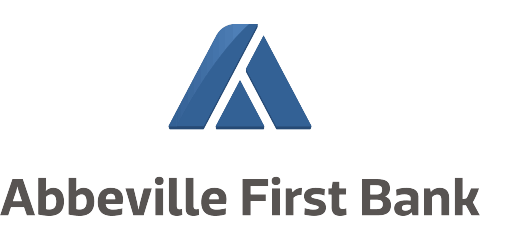Routing Number
Abbeville First Bank’s Routing Number is 253271806.
Identity Theft
Identity theft occurs when someone steals your personal information to establish credit, purchase items, or borrow money in your name.
How can you protect yourself? Here are some important facts, tips, and reminders:
Safeguard your financial information such as checking and credit card numbers, and your Social Security number. Unless you know the person or organization you’re dealing with, don’t give it out, even to someone claiming to be from your bank.
Report lost or stolen checks immediately. Review new deliveries of new checks to make sure none have been stolen in transit.
Notify your bank of suspicious phone inquiries, such as those asking for account information to “verify a statement” or “award a prize.”
Shred financial solicitations or financial statements before disposing of them.
Deposit your mail into a secure, official Postal Service collection box
If regular bills fail to reach you, call the company to find out why. Someone may have filed a false change-of-address notice to divert your mail and steal your identity.
If your bills include questionable items, investigate immediately. This is often the first sign of identity theft fraud.
Avoid phishing scams. Never reply directly or click on a link in response to an email that asks for personal or financial information. If you are concerned about your account, contact the company or institution via a website you know to be genuine. Remember- your bank will never contact you “out of the blue” to ask for personal financial information.
What should you do if you got hooked by a phishing scam?
If you provided account numbers, PINs, or passwords to a phisher, notify the companies with which you have those accounts immediately.
Put a “fraud alert” on your files at the credit reporting bureaus. For information about how to do that and other advice for ID theft victims, contact the Federal Trade Commission’s ID Theft Clearinghouse online or toll-free (877) 438-4338. The TDD number is (202) 326-2502.
Even if you didn’t get hooked, you should report phishing to the company or agency that was being impersonated to the National Consumers League’s National Fraud Information Center at fraud.org or toll-free at (800) 876-7060. The TDD number is (202) 835-0778.
Remember, security tools such as PIN numbers and passwords help keep your transactions safe. Keep them private.
When in doubt, contact Abbeville First Bank directly at (864) 366-2158.
Preventing Elder Financial Abuse
Financial Abuse is the illegal, unauthorized, or improper use of an elder’s money, benefits, belongings, property, or assets for the benefit of someone other than the older adult.
If you suspect elder financial abuse, report it to Adult Protective Services (APS). APS are social services programs in each state. They serve older adults and adults with disabilities who need help due to abuse, neglect, or exploitation. Adult Protective Services is a common term, but this may not be the name of the agency in your state. Find your local APS.
If there is an urgent risk of harm to your loved one or someone else, you should call 911 right away. Otherwise, you can call the non-emergency number for your local police or Sheriff’s office to file a report. Some state laws define elder financial abuse as a specific type of crime. Financial abuse may also involve other crimes such as theft, fraud, forgery, embezzlement, or money laundering.
You can also report financial abuse to your local District Attorney’s office and ask them to prosecute the person who took advantage of your loved one.
Free Credit Reports: Fast Facts
A law (The Fair and Accurate Credit Transactions Act, or FACT Act) requires each of the three credit reporting agencies to provide you with a free copy of your credit report, at your request, once every 12 months. A credit report contains information about you and your credit/payment history. This information is used to evaluate your applications for credit, insurance employment, renting a home and for other purposes.
You can get your report at:
www.annualcreditreport.com, or call (877) 322-8228.
You can also contact the credit reporting companies:
Equifax (www.equifax.com)
(800) 685-1111
Experian (www.experian.com)
(888) 397-3742
TransUnion (www.transunion.com)
(800) 888-4213
Order from all three since each one derives its information from different sources.
You can also get a free report if:
A company takes adverse action against you, such as denying you credit;
Your report is inaccurate because of fraud.
You are unemployed and plan to look for a job within 60 days;
You are on welfare;
If you find inaccuracies in the report:
Tell the credit reporting company—they must investigate right away and forward your data to the company that provided the inaccurate information.
Tell the creditor in writing that you dispute the item.
An employer or prospective employer cannot get a copy of your credit report without your written consent.



